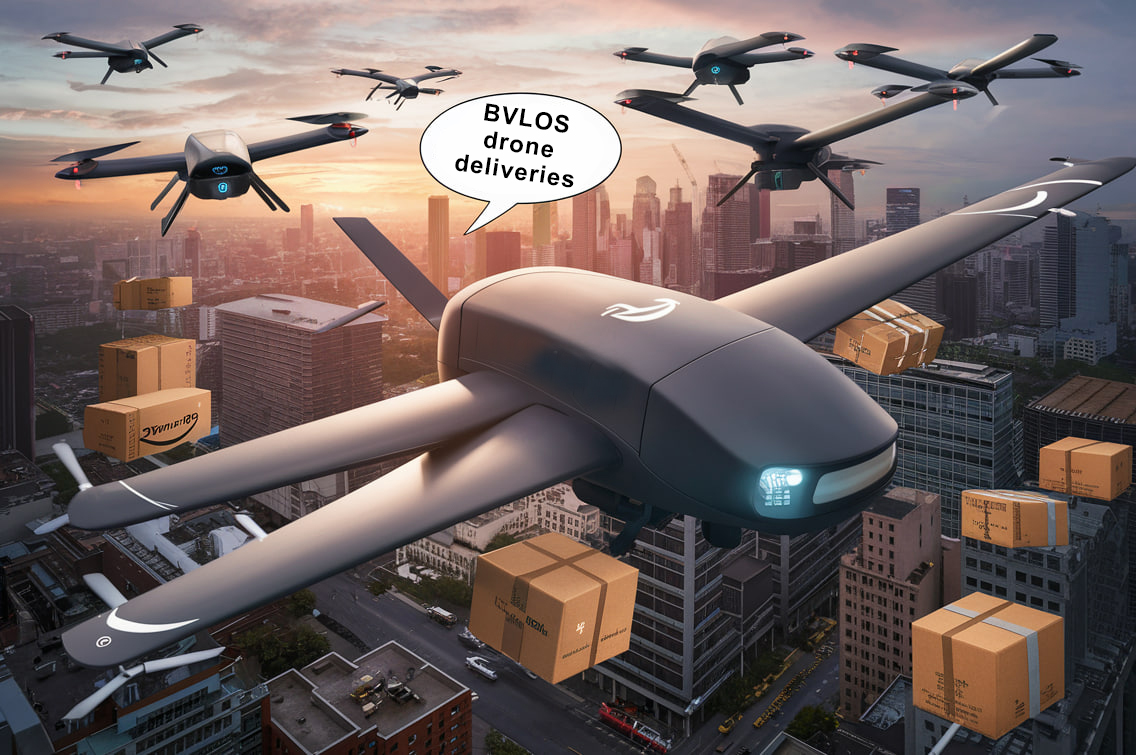In a significant milestone for autonomous drone delivery, Amazon's Prime Air division has received additional permissions from the Federal Aviation Administration (FAA) to expand its beyond visual line-of-sight (BVLOS) operations. This regulatory approval paves the way for Amazon to scale up its ambitious plan to deliver millions of packages via highly automated drones in the coming years.
For commercial drone operators, maintaining a direct line of sight with their unmanned aircraft has been the standard FAA requirement - until technologies enabling safe, reliable BVLOS flight can be proven. Amazon has now convincingly demonstrated such a system to aviation regulators.
"Our vision has remained unchanged since we started working on Prime Air: to create a safe and scalable way to deliver packages to customers in 30 minutes or less using highly autonomous drones," Amazon stated in a blog post. "To achieve our goal of delivering 500 million packages per year by drone by the end of this decade, we knew we had to design a system capable of serving highly populated areas and that was safer than driving to the store."
Overcoming the BVLOS Hurdle
The key to Amazon's BVLOS approval was its onboard detect-and-avoid technology, which has undergone years of intensive development, testing, and refinement. The e-commerce giant provided the FAA with extensive engineering documentation detailing the design, operation, maintenance, and validation of this sensor-based system.
Additionally, Amazon conducted live flight demonstrations for FAA inspectors, showcasing the detect-and-avoid capability's performance in real-world scenarios - including safely navigating around crewed aircraft like planes, helicopters, and even hot air balloons. Comprehensive analysis and test data further validated the system's safety case.
With this evidence, the FAA granted Amazon waivers for two key regulations restricting small unmanned aircraft operations: visibility requirements (14 CFR § 107.51(c)) and cloud clearances (14 CFR § 107.51(d)). These exemptions clear the way for Prime Air's drones to fly BVLOS in a wider range of conditions.
"This new authorization allows Amazon Prime Air to expand its drone delivery area in College Station, Texas, enabling more customers to choose from thousands of items," the company stated. It plans to rapidly integrate drone deliveries into its logistics network nationwide.
Prioritizing Safety as Operations Ramp Up
As its BVLOS operations ramp up, Amazon is adamant that safety will remain the top priority. The company's onboard detect-and-avoid system will ensure drones can reliably spot and avoid obstacles, complying with strict FAA safety standards even in more densely populated areas.
"Later this year, drone deliveries will integrate into Amazon's delivery network, deploying from facilities next to Same-Day Delivery sites for faster delivery of a wider selection of items," Prime Air revealed.
The FAA granted Amazon an Air Carrier Certificate in 2020, certifying it to operate as an airline for drone deliveries. With that Part 135 certification and now broader BVLOS approvals, Prime Air says it is well-positioned to rapidly scale autonomous package delivery across the U.S.
Amazon's latest regulatory win underscores how continuing advances in drone technology are steadily unlocking opportunities for widespread commercial operations, ushering in a future of seamless unmanned logistics. For the e-commerce leader's part, the drive toward its audacious 500 million drone delivery goal is now flying full speed ahead.


















